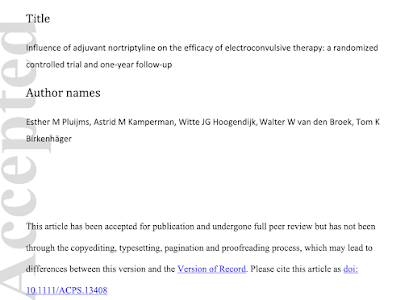Nortriptyline Does Not Enhance Acute ECT: New Small Study From Europe
Out on PubMed, from researchers in The Netherlands and Belgium, is this study:
Influence of adjuvant nortriptyline on the efficacy of electroconvulsive therapy: a randomized controlled trial and one-year follow-up.
Objective: There is limited evidence that adding an antidepressant to electroconvulsive therapy (ECT), compared with ECT monotherapy, improves outcomes. We aimed to determine whether the addition of nortriptyline to ECT enhances its efficacy and prevents post-ECT relapse.
Methods: We conducted a randomized, double-blind, placebo-controlled trial (RCT). Patients with major depressive disorder and an indication for ECT received either nortriptyline or placebo during a bilateral ECT course. Outcome measures were mean decrease in Hamilton Rating Scale for Depression (HRSD) score, response, remission, and time to response and remission. Patients who attained remission participated in a one-year follow-up study with open-label nortriptyline. Outcome measures were relapse and time to relapse.
Results: We included 47 patients in the RCT. In the nortriptyline group, 83% showed response, 74% attained remission, and the mean decrease in HRSD score was 21.6 points. In the placebo group these figures were, respectively, 81% (p=0.945), 73% (p=0.928) and 20.7 points (p=0.748). Thirty-one patients participated in the follow-up study. In patients who had received nortriptyline during the RCT, 47% relapsed at a mean of 34.2 weeks. Patients who had received placebo showed similar treatment results. In both study phases no statistically significant differences between the nortriptyline and the placebo group were found.
Conclusion: In our sample of severely depressed patients who were often medication resistant and suffering from psychotic depression, the addition of nortriptyline to ECT did not enhance its efficacy or prevent post-ECT relapse. Encouragingly, even in these patients ECT was highly effective and relapse rates were relatively low.
Keywords: Randomized controlled trial; electroconvulsive therapy; major depressive disorder; nortriptyline; relapse.
The article is here.
And from the text:
This is an interesting small study from a sophisticated research group in the Low Countries. Nortriptyline during the acute course of ECT provided no added benefit; patients in both study groups (placebo or nortriptyline acutely) were put/kept on nortriptyline in the year follow up, and did equally well, with relatively good maintenance of improvement. The authors' statement about the efficacy of nortriptyline for relapse prevention in the abstract (above) is unclear: what they mean is that having nortriptyline on board during the acute course, rather than adding it at the end of the ECT course, was not better for relapse prevention in their study follow up period. It is very misleading to label one of the groups in Table 3 (about the follow up period) "Placebo", since all patients were on open-label nortriptyline. Another criticism of the paper is the incomplete literature review, with nary a mention of the CORE or PRIDE studies, with relevant (although not identical) data for this topic of acute and post ECT pharmacotherapy. I recommend a full read to all ECT practitioners, ~15 minutes.








Comments
Post a Comment